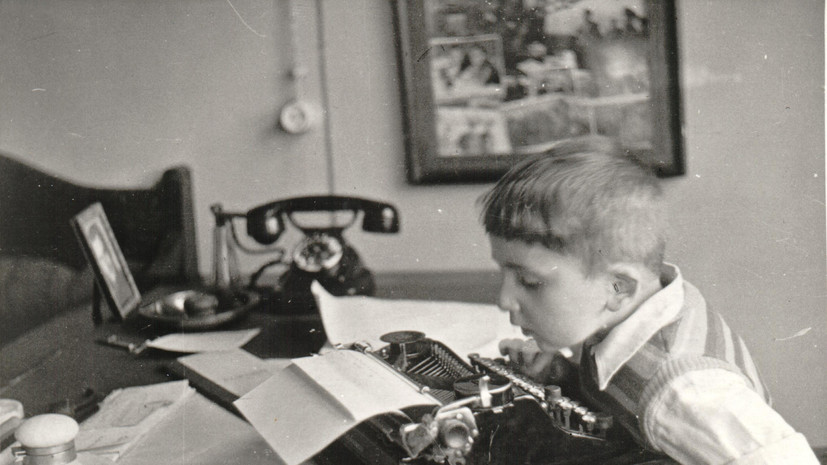Alexei Kirillovich Simonov in 2020 will turn 81 years old. He lays out before us his photographs taken during the Great Patriotic War, when he was just a child.
His father, Cyril Simonov, who wrote under the pseudonym Konstantin Simonov, was already one of the most famous poets of the Soviet Union by that time: about a year and a half before the pictures were taken, his poem “Wait for me” appeared in Pravda . The personal archive of the poet and war correspondent, who visited all fronts, contains hundreds of answers that came to this poem, some of which are also in verse.
Alexei Kirillovich talks about his photographs, where he is four years old:
“Year 1943. This year my mother and I returned from Chelyabinsk from evacuation, and my father received his first Moscow accommodation on Leningradsky Prospekt, in the openwork house opposite the Yar restaurant and the Sovetskaya Hotel. And mom and dad live separately, because they brought me here.
Obviously, to my pleasure, they put my father's helmet on me and let me hold the trophy machine. Two other photographs of that day: I, like dad, behind a typewriter (although dad just did not like to print and, in my opinion, did not know how), and dad and I "smoke."
Probably, considering that I am writing all this, a photograph with a typewriter is relevant, but I like the one where I, a small with a German machine gun, imagine myself a father hero - a Soviet soldier . ”
Now these pictures, combined by the work of collage-artist from Italy Claudia Corrent, are published as part of the #Pobeda Victory page in your Facebook account, which collects all the dedications of the Great Patriotic War in the genre of digital art.
The work of Konstantin Simonov became a kind of symbol of that war. This is not only “Wait for me, and I'll be back”, but also “Major brought the boy on a gun carriage”, “Do you remember Alyosha, the roads of Smolensk region”, as well as diaries, novels, essays and much more.
Stories and images inspired by the legendary works of Konstantin Simonov formed the basis of posters opening the series of graphic works “Four lines about the war” by the famous artist Peter Bankov. Alexei Kirillovich wrote four essays for these posters, telling the story of the creation of famous lines.
It turned out, in particular, that the mother of Konstantin Simonov, Alexander Ivanishev, after reading “Wait for me”, was not satisfied with the lines: “Let the son and mother believe that there is no me” - and even sent her son an indignant answer, also in verse.
Or that the correspondent Aleksey Surkov, comrade Konstantin Simonov, with whom they retreated after the Soviet army in 1941 and to whom the poem “Do you remember Alyosha, Smolensk region roads” was dedicated, was embroiled in an ideological struggle with the poet in the 1950s. Alexei Kirillovich writes in an essay to the poem:
“At the end of the 50s, Simonov published two novels on the pages of the magazine“ Moscow ”:“ Panteleev ”, dedicated to the battles on the Arabatsky arrow in the Crimea, and“ Another day ”about the defense of Odessa. Both that, and another - 1941. Everything was written firmly and honestly, in the spirit of "trench truth", as the threshold of the future "lieutenant literature."
And the authorities did not like it much. They thought that it was necessary to short-circuit the over-arching writer. And someone had to believe it to do it. Better yet, Simonov himself confirms his veracity. And they found.
The article that Simonov, in describing desperate and heroic efforts to somehow correct the tragedy of 1941 exaggerates difficulties, goes too far in the tragedy, was written by Alexei Surkov, whose military experience and friendly disposition are so distinct in the poem dedicated to him. "
Posters from the Four Lines about the War series can be seen on the site #Pobrika Victory - in the same place you can read all the essays by Alexei Kirillovich. Did the poet forgive Alexei Surkov? How exactly did Simonov propose Utesov to perform War Correspondent? Is there any music on "Wait for me"? All this is in short but capacious stories of the writer, translator, human rights activist, journalist and director Alexei Kirillovich Simonov.
Join the # Victory Pages on Facebook, YouTube, Instagram, VKontakte and follow the hourly chronicle of the last months of the war on Twitter. You can also write a letter to veterans in the project #Post-Victory.

